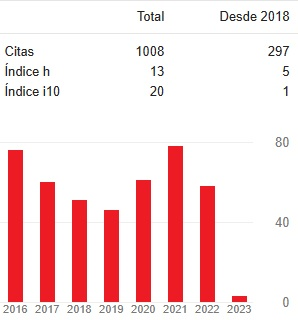THE DREAMED AND HAPPENED: THE SPANISH COLONIAL SYSTEM AND ITS EFFECTS IN ANNUAL
DOI:
https://doi.org/10.51743/cih.236Keywords:
Annual, disaster, Rif, Spain, war, colonialism, dramaAbstract
El Desastre de Annual (1921) is undoubtedly the most relevant event in our recent military history due to the military and political connotations it had. Often times, the defeat has been rightly blamed on factors such as the ineffectiveness of the Spanish strategic system, the ineptitude of superior officers, or unfavorable ground conditions. The late arrival of Spain to the international concert in the division of Africa, due to the previous existence of an overseas empire that made the search for wealth in other places superfluous, led to our country being relegated to the less fertile and hostile areas of the continent; Spain's manifest weakness in the international order at the end of the 19th century was subordinated to the interests of the great powers; on the other hand, the decline of this empire coincided with the rise of the other powers, affecting self-esteem and therefore the professionalism and effectiveness of the troops. Therefore, the purpose of the following article is to reflect and relate a series of ideas that, in our opinion, were key to understanding El Desastre de Annual and that appeared in the preceding decades, launching small but illustrious warnings of what could happen.
Downloads
Global Statistics ℹ️
|
645
Views
|
977
Downloads
|
|
1622
Total
|
|
References
Richard HALL, Exploradores en África, Madrid, Lagos, 1978; Anne HUGON, La gran aventura africana, exploradores y colonizadores, Barcelona, Ediciones B, 1998.
José Manuel AZCONA y Miguel MADUEÑO, Guerra y orden internacional, Madrid, Síntesis, 2021, págs. 18-21.
Joan SERRALLONGA URQUIDI, "La guerra de África (1859-1860). Una revisión", Ayer, 29, (1998), págs 139-159; Emilio CASTELAR, Crónica de la Guerra de África, Madrid, imprenta de V. Matute y B. Compagni, 1859.
Juan Francisco FUENTES, El fin del Antiguo Régimen (1808-1868). Política y sociedad, Madrid, Síntesis, 2007, pág. 215.
Jesús María MARTÍNEZ MILÁN, "Sidi Ifni en el contexto del colonialismo español en el sur de Marruecos, 1912-1956", Hesperis-Tamuda, 46, (2011), págs. 39-64;
Juan Carlos LOSADA ALVAREZ, "Los límites de Melilla. La Guerra de Margallo", La Aventura de la historia, 206, (2015), pags. 34-39.
Manuel FERNÁNDEZ RODRÍGUEZ, España y Marruecos en los primeros años de la Restauración (1875-1894), Madrid, Consejo Superior de Investigaciones Científicas, 1985, pág. 283.
Carlos QUIJANO JUNQUERA, “El explorador Manuel de Iradier y la conquista del Muni”, en Guerra Colonial, 8, 2021, págs. 95-120.
Véase Julia MORENO GARCÍA, "La Conferencia de Berlín y el reparto colonial de Africa (1885-1904)", Ciencia y memoria de África: actas de las III Jornadas sobre Expediciones científicas y africanismo español, 1898-1998, Alcalá de Henares, Servicio de Publicaciones de la UAH, 2002.
Véanse Gonzalo de REPARAZ, La guerra de Cuba: estudio militar, Madrid, La España Editorial, 1896 y Juan Carlos LOSADA, Historia de las guerras de España, Madrid, Pasado y presente, 2015.
David STEVENSON, «Militarization and Diplomacy in Europe before 1914», International Security, 22 (1), 1997, págs. 125-161. DOI: https://doi.org/10.1162/isec.22.1.125
Eugene ANDERSON, The first Moroccan crisis : 1904-1906, Chicago, The University Of Chicago Press, 1930, pág. 186. DOI: https://doi.org/10.1086/235714
Véase, Alejandro VALLE GÁLVEZ, España y Marruecos: en el centenario de la conferencia de Algeciras, Madrid, Editorial Dykinson, 2007.
Fernando NAVARRO BELTRAME, "Mittelafrika: Canarias y la geopolítica alemana en el África subsahariana y el el Magreb (1871-1919)", Vector Plus, 2010, págs. 63-76.
Mark W DELANCEY y Mark Dike DELANCEY, Historical Dictionary of the Republic of Cameroon, Lanham, Maryland, The Scarecrow Press, 2000, pág. 200.
Francisco ESCRIBANO BERNAL, “El ejército español en África”, Desperta Ferro, 30, 2018, pág. 8.
https://bibliotecavirtual.defensa.gob.es/BVMDefensa/es/catalogo_imagenes/grupo.do?path=96195, consultado el 23 de abril de 2021.
Francisco ESCRIBANO BERNAL, “El ejército español en África”, Desperta Ferro, 30, 2018, pág. 7.
Ángel SÁEZ RODRÍGUEZ, “El sistema de blocaos”, Desperta Ferro, 30, 2018, pág. 27. El campamento de Annual llegó a albergar, en vísperas del Desastre, a más de cinco mil hombres.
La falta de agua está perfectamente detallada en Ricardo FERNÁNDEZ DE LA REGUERA y Susana MARCH, El desastre de Annual, Barcelona, Planeta, 1968.
No fue un hecho privativo del ejército español y ocurrió algo similar en la batalla de Isandlwana (1879) entre Anthony Durnford y Lord Chelmsford, subestimando al ejército zulú, una fuerza muy militarizada y entrenada durante medio siglo para la guerra; y en Adua (1896) en la que las hueste etíopes aprovecharon la rivalidad entre los jefes de las columnas italianas, generales Baratieri, Dabormida, Albertone y Helena, en Julio Alberto ALFONSO GONZÁLEZ, “Amanecer zulú: iklwas, Martini-Henrys y celuloide”, Guerra Colonial, 1, 2017, págs. 27-46 y Miguel MADUEÑO ÁLVAREZ, “La batalla de Adua”, Revista Digital de Historia Militar, 2016, págs. 1-10.
Downloads
Published
How to Cite
Issue
Section
License
The Fundación Universitaria Española publishing house preserves the patrimonial rights (copyright) of published works, and encourages and allows their reuse. The works are published in the electronic edition of the journal under a license “Creative Commons Atribución/Reconocimiento-NoComercial 4.0 Licencia Pública Internacional — CC BY-NC 4.0”, and can be copied, used, disseminated, transmitted and publicly exhibited, provided that : a) the authorship and original source of its publication is cited (journal, publisher and URL of the work); b) are not used for commercial purposes; c) the existence and specifications of this license of use are mentioned.
The author / s partially transfer the property rights (copyright) of this work to the Fundación Universitaria Española (Spain) (NIF: G28433670), for the printed and online editions.
It also declares to have respected the ethical principles of research and to be free from any conflict of interest.
«C.I.H.» encourages the authors and the scientific community to the maximum promotion and dissemination of the works in their final version through:
1) Your list of contacts (emails) and social networks (Facebook, Twitter, LinkedIn ...).
2) Institutional repository of your University and public repositories (Mendeley, Cosis ...).
3) Scientific social networks (ResearchGate, Academia.edu, Kudos ...).
4) Personal or institutional website, blog, etc.
5) Google Scholar, ORCID, ResearchID, ScopusID, Dimensions, PlumX ...
6) Printed copies purchased directly and sent to specialists for reading and subsequent citation if appropriate.
For the nomination of future articles by authors of "C.I.H.", the impact of previous works will be taken into account, so that those with citation higher than the annual average of the journal will be preferred.












2.jpg)
















1.png)
1.png)

1.png)


.png)
.png)

.png)
1.png)
1.png)
